Aerospace Plastics Market
Aerospace Plastics Market Size and Share Forecast Outlook 2025 to 2035
Aerospace plastics market is projected to grow from USD 6.8 billion in 2025 to USD 10.4 billion by 2035, at a CAGR of 4.3%. PEEK/PEKK/PAEK will dominate with a 34.0% market share, while cabin interiors will lead the application segment with a 45.0% share.
Aerospace Plastics Market Forecast and Outlook 2025 to 2035
The aerospace plastics market stands at the threshold of a decade-long expansion trajectory that promises to reshape aviation material technology and lightweight solutions. The market's journey from USD 6.8 billion in 2025 to USD 10.4 billion by 2035 represents substantial growth,the market will rise at a CAGR of 4.3% which demonstrating the accelerating adoption of advanced plastic technology and aerospace optimization across cabin interior applications, airframe structures, and aircraft systems sectors.
The first half of the decade (2025-2030) will witness the market climbing from USD 6.8 billion to approximately USD 8.3 billion, adding USD 1.5 billion in value, which constitutes 42% of the total forecast growth period.
Quick Stats for Aerospace Plastics Market
- Aerospace Plastics Market Value (2025): USD 6.8 billion
- Aerospace Plastics Market Forecast Value (2035): USD 10.4 billion
- Aerospace Plastics Market Forecast CAGR: 4.3%
- Leading Product Type in Aerospace Plastics Market: PEEK/PEKK/PAEK Polymers
- Key Growth Regions in Aerospace Plastics Market: North America, Europe, and Asia Pacific
- Top Players in Aerospace Plastics Market: Solvay, Victrex, SABIC, Evonik, Arkema
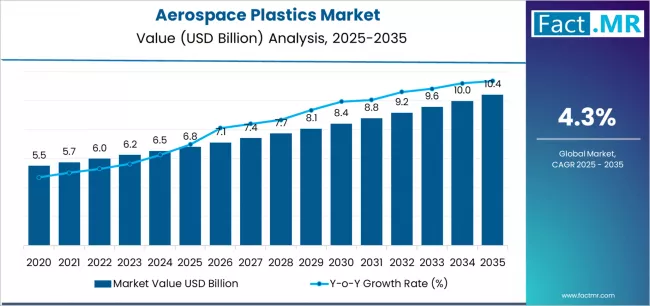
This phase will be characterized by the rapid adoption of PEEK/PEKK/PAEK polymer systems, driven by increasing aircraft production and the growing need for advanced lightweight solutions worldwide. Enhanced performance capabilities and automated manufacturing systems will become standard expectations rather than premium options.
The latter half (2030-2035) will witness continued growth from USD 8.3 billion to USD 10.4 billion, representing an addition of USD 2.1 billion or 58% of the decade's expansion. This period will be defined by mass market penetration of advanced aerospace plastic technologies, integration with comprehensive aviation platforms, and seamless compatibility with existing aircraft manufacturing infrastructure. The market trajectory signals fundamental shifts in how aerospace companies approach material performance and weight optimization, with participants positioned to benefit from growing demand across multiple polymer types and application segments.
The growth trajectory of the aerospace plastics market will be reinforced by the aviation industry’s transition toward fuel efficiency, sustainability, and next-generation aircraft design. Lightweight polymers are becoming increasingly vital as manufacturers seek to reduce aircraft weight, improve fuel economy, and lower carbon emissions without compromising structural strength or safety standards. Advanced thermoplastics such as PPS PC, ABS, and PMMA are expected to gain prominence in interior components, window panels, and structural reinforcements due to their superior thermal stability, flame retardancy, and ease of fabrication. Additionally, the growing adoption of additive manufacturing and 3D printing technologies will enable precise component design, material optimization, and faster prototyping cycles, accelerating innovation within the aerospace plastics ecosystem.
Strategic collaborations between polymer producers, OEMs, and aircraft part suppliers will continue to shape the industry landscape, ensuring the development of customized plastic solutions aligned with evolving regulatory and performance benchmarks. The rising integration of recyclable and bio-based plastics will further support the aviation sector’s commitment to sustainability, enhancing circular economy practices and reducing dependency on metal-based components. As air travel demand continues to surge globally, driven by expanding commercial fleets and emerging regional carriers, aerospace plastic manufacturers with advanced R&D capabilities and scalable production models will be best positioned to capture long-term growth opportunities.
Where revenue comes from - Now Vs Next (industry-level view)
| Period | Primary Revenue Buckets | Share | Notes |
|---|---|---|---|
| Today | PEEK/PEKK/PAEK polymers | 34% | Volume-driven, structural applications |
| Polycarbonate & PMMA | 33% | Transparency focus, cabin use | |
| PPS/PEI & others | 33% | Specialty applications, systems use | |
| Future (3-5 yrs) | Advanced PEEK systems | 32-36% | Technology enhancement, performance optimization |
| Enhanced transparency solutions | 31-35% | Optical improvement, cabin positioning | |
| Specialty polymer varieties | 31-35% | Innovation applications, premium positioning |
Aerospace Plastics Market Key Takeaways
At-a-Glance Metrics
| Metric | Value |
|---|---|
| Market Value (2025) → | USD 6.8 billion |
| Market Forecast (2035) ↑ | USD 10.4 billion |
| Growth Rate ★ | 4.3% CAGR |
| Leading Product → | PEEK/PEKK/PAEK Polymers |
| Primary Application → | Cabin Interiors Segment |
The market demonstrates strong fundamentals with PEEK/PEKK/PAEK polymers capturing a leading 34.0% share through advanced structural capabilities and aerospace optimization. Cabin interiors applications drive primary demand with 45.0% market share, supported by increasing aircraft production requirements and passenger comfort programs.
Geographic expansion remains concentrated in developed markets with established aerospace infrastructure, while emerging economies show accelerating adoption rates driven by aviation initiatives and rising aircraft manufacturing standards.
Imperatives for Stakeholders in Aerospace Plastics Market
Design for aviation versatility, not just weight reduction
- Offer complete aerospace packages: aerospace plastics + processing support + documentation + certification guidance + technical training.
- Preconfigured manufacturing workflows: forming protocols, joining procedures, quality records, and digital tracking on aerospace operations.
Technology readiness for next-generation aircraft
- Real-time performance monitoring analytics, predictive durability capabilities, and smart manufacturing integration (equipment connectivity, quality tracking systems).
Performance-by-design approach
- Automated processing systems, real-time consistency mechanisms, statistical quality monitoring integration, and paperless production documentation.
Value-based material models
- Clear base plastic price + transparent service tiers (processing support, technical availability, certification guarantees); subscriptions for digital services and analytics.
Segmental Analysis
By polymer type, the market is segmented into PEEK/PEKK/PAEK, polycarbonate & PMMA, and PPS/PEI and other variants, representing the evolution from basic plastics to specialized products for comprehensive aerospace and aviation optimization.
The application segmentation divides the market into cabin interiors (45.0%), airframe & structures (31.0%), and systems & others (24.0%) sectors, reflecting distinct requirements for performance capabilities, safety standards, and processing compatibility.
The aircraft segmentation covers commercial (62.0%), business & GA (23.0%), and defense (15.0%) categories, addressing different aviation requirements from passenger aircraft to military applications.
By Polymer, the PEEK/PEKK/PAEK Segment Accounts for Dominant Market Share
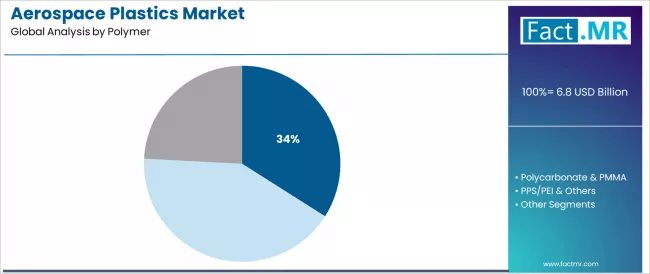
PEEK/PEKK/PAEK polymers command the leading position in the aerospace plastics market with 34.0% market share through advanced high-performance characteristics, including superior temperature resistance, chemical stability, and structural optimization that enable aerospace manufacturers to achieve optimal material properties across diverse aircraft and aviation applications.
The segment benefits from manufacturer preference for reliable high-performance systems that provide consistent structural performance, reduced weight complexity, and aerospace optimization without requiring significant design modifications. Advanced polymer features enable automated processing systems, temperature control, and integration with existing aerospace equipment, where operational performance and certification compliance represent critical manufacturing requirements.
PEEK/PEKK/PAEK polymers differentiate through proven aerospace reliability, consistent structural characteristics, and integration with automated manufacturing systems that enhance production effectiveness while maintaining optimal safety standards for diverse aircraft and aviation applications.
Key market characteristics:
- Advanced polymer designs with optimized temperature configuration and structural efficiency capabilities
- Enhanced aerospace effectiveness, enabling 90-95% weight reduction with reliable performance
- Aircraft compatibility, including automated processing systems, monitoring integration, and process optimization for polymer performance
Polycarbonate & PMMA Systems Show Strong Transparency Focus
Polycarbonate & PMMA materials maintain a 33.0% market position in the aerospace plastics market due to their proven optical benefits and transparency characteristics. These systems appeal to manufacturers requiring visual performance with targeted positioning for cabin and window applications. Market growth is driven by transparency segment expansion, emphasizing reliable optical solutions and passenger comfort optimization through proven formulations.
PPS/PEI & Others Systems Serve Specialty Applications
PPS/PEI & others materials account for 33.0% market share, serving specialty applications requiring unique performance characteristics and specialized properties for systems and high-temperature requirements.
By Application, the Cabin Interiors Segment Shows Market Leadership
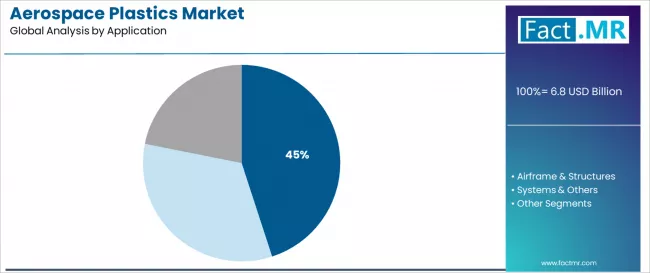
Cabin interiors demonstrate market leadership in the aerospace plastics market with 45.0% share due to widespread adoption of lightweight material systems and increasing focus on passenger optimization, comfort efficiency, and interior enhancement that maximize passenger experience while maintaining safety standards.
Aircraft manufacturers prioritize material consistency, weight efficiency, and integration with existing cabin infrastructure that enables coordinated interior operations across multiple aircraft systems. The segment benefits from substantial aviation investment and passenger comfort programs that emphasize the acquisition of advanced plastic systems for cabin optimization and interior enhancement applications.
Aviation programs incorporate aerospace plastics as standard components for cabin operations, while passenger comfort growth increases demand for consistent lightweight capabilities that comply with safety standards and minimize aircraft weight.
Application dynamics include:
- Strong growth in passenger aircraft requiring advanced lightweight capabilities
- Increasing adoption in comfort optimization and interior enhancement applications for aircraft manufacturers
- Rising integration with automated cabin systems for operational optimization and safety assurance
Airframe & Structures Applications Maintain Strong Structural Focus
Airframe & structures applications capture 31.0% market share through comprehensive structural requirements in aircraft operations, fuselage applications, and structural projects. These applications demand reliable plastic systems capable of operating under stress conditions while providing effective structural integration and performance capabilities.
Systems & Others Applications Show Diverse Growth
Systems & others applications account for 24.0% market share, including electrical systems, mechanical components, and specialty requiring efficient plastic solutions for performance optimization and system enhancement.
By Aircraft, the Commercial Segment Leads Market Share
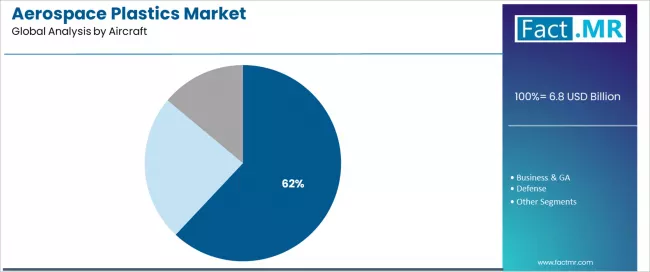
The commercial segment commands 62.0% market share through widespread adoption in passenger aircraft applications, airline operations, and commercial aviation projects. These aircraft provide advanced transportation solutions for global travel requirements while maintaining operational flexibility and safety reliability.
Business & GA Aircraft Show Premium Focus
Business & GA aircraft capture 23.0% market share, serving private aviation applications, corporate travel, and operations requiring enhanced comfort capabilities for performance optimization and passenger appeal.
Defense Aircraft Serve Specialized Applications
Defense aircraft account for 15.0% market share, addressing military requirements, defense operations, and applications requiring unique plastic capabilities for performance optimization.
What are the Drivers, Restraints, and Key Trends of the Aerospace Plastics Market?
| Category | Factor | Impact | Why It Matters |
|---|---|---|---|
| Driver | Aircraft production growth & fleet expansion (commercial aviation, passenger demand) | ★★★★★ | Large-scale aircraft manufacturing requires efficient, high-performance plastic solutions with consistent quality and weight integration across aviation applications. |
| Driver | Weight reduction initiatives & fuel efficiency (carbon footprint reduction, operational costs) | ★★★★★ | Drives demand for efficient lightweight solutions and performance-compliant capabilities; suppliers providing weight-saving features gain competitive advantage. |
| Driver | Advanced materials adoption & technology integration (next-generation aircraft, composite structures) | ★★★★☆ | Aerospace companies need advanced, high-performance plastic solutions; demand for innovative lightweight features expanding addressable market segments. |
| Restraint | High certification costs & regulatory requirements | ★★★★☆ | Small manufacturers face certification pressure; increases compliance complexity and affects adoption in cost-sensitive segments with limited resources. |
| Restraint | Long development cycles & qualification processes | ★★★☆☆ | Quality-focused operations face challenges with time complexity and specialized qualification requirements, limiting adoption in resource-constrained segments. |
| Trend | Smart materials integration & sensor connectivity | ★★★★★ | Growing demand for intelligent plastic solutions; digital connectivity becomes core value proposition in advanced aerospace manufacturing segments. |
| Trend | Sustainable aviation & circular economy | ★★★★☆ | Regional development drives demand for sustainable plastic solutions; recycling capabilities drive competition toward sustainability. |
Analysis of the Aerospace Plastics Market by Key Country
The aerospace plastics market demonstrates varied regional dynamics with growth leaders including USA (5.0% growth rate) and Mexico (4.7% growth rate) driving expansion through aircraft manufacturing initiatives and aerospace development. Strong Performers encompass Germany (4.3% growth rate), France (4.1% growth rate), and UK (3.8% growth rate), benefiting from established aerospace industries and advanced material adoption. Mature Markets feature South Korea (3.6% growth rate) and Japan (3.4% growth rate), where aerospace innovation and quality standardization requirements support consistent growth patterns.
Regional synthesis reveals North American markets leading adoption through aircraft production expansion and aerospace development, while European countries maintain steady expansion supported by aviation advancement and regulatory compliance requirements. Emerging markets show strong growth driven by aerospace applications and manufacturing integration trends.
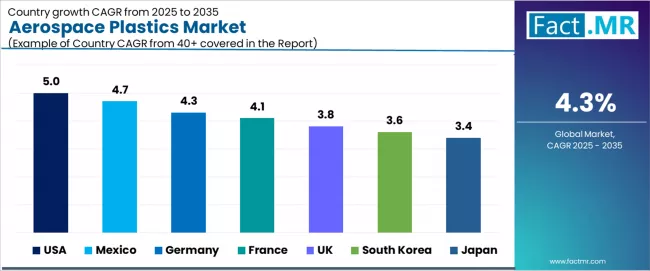
| Region/Country | 2025-2035 Growth | How to win | What to watch out |
|---|---|---|---|
| USA | 5.0% | Focus on aircraft manufacturing-focused plastic solutions | Certification complexity; regulatory requirements |
| Mexico | 4.7% | Lead with cost-effective aerospace models | Economic dependencies; infrastructure limitations |
| Germany | 4.3% | Value-oriented innovation models | Over-engineering; regulatory compliance |
| France | 4.1% | Offer premium aerospace systems | Market maturity; certification regulations |
| UK | 3.8% | Provide advanced manufacturing integration | Market maturity; processing standards |
| South Korea | 3.6% | Push aerospace innovation applications | Technology costs; domestic competition |
| Japan | 3.4% | Premium quality positioning | Market maturity; precision requirements |
Extensive Aircraft Manufacturing Modernization Initiatives Fuels Growth in the USA
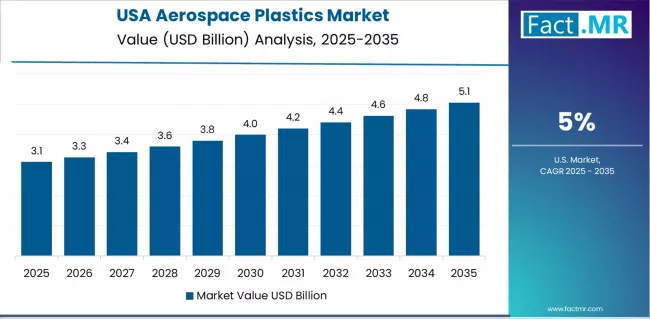
The USA is expected to register the fastest market growth. This is attributed to the implementation of extensive aircraft manufacturing expansion programs and comprehensive aerospace development. Market players are integrating advanced aerospace plastic systems as standard components in aircraft production, aviation operations, and aerospace applications. A CAGR of 5.0% is projected for the US market.
This growth reflects industry initiatives promoting manufacturing efficiency and aviation development capabilities that mandate the use of advanced plastic systems in aerospace projects. Growth concentrates in major aerospace centers, including Washington, California, and Texas, where aerospace technology development showcases integrated plastic systems that appeal to manufacturers seeking advanced material optimization capabilities and aircraft enhancement applications.
Manufacturers are developing aircraft manufacturing-focused plastic solutions that combine domestic production advantages with advanced lightweight features, including processing optimization systems and enhanced performance capabilities. Distribution channels through aerospace suppliers and aviation service distributors expand market access, while industry support for aerospace development supports adoption across diverse plastic segments.
Strategic Market Indicators:
- Aircraft manufacturing facilities leading adoption with 95% deployment rate in plastic production and aerospace sectors
- Aviation development programs providing substantial demand for domestic aerospace technology development
- Local plastic manufacturers capturing 72% market share through competitive pricing and localized technical support
- Export market development for aircraft-focused aerospace plastic solutions targeting emerging aviation markets
Mexico Emerges as High-Growth Market
Mexico's market expansion benefits from diverse aerospace development demand, including aircraft manufacturing growth in aerospace clusters and manufacturing regions, aviation expansion upgrades, and aerospace programs that increasingly incorporate plastic systems for production optimization applications.
The country maintains a 4.7% growth rate, driven by rising aerospace development and increasing recognition of advanced plastic benefits, including enhanced manufacturing performance and improved aircraft functionality.
Market dynamics focus on cost-effective aerospace plastic solutions that balance advanced aviation performance with affordability considerations important to Mexican aerospace operators. Growing aircraft development creates continued demand for plastic systems in aerospace infrastructure and production enhancement projects.
Strategic Market Indicators:
- Aerospace manufacturing facilities leading adoption with 82% deployment rate in aircraft and aviation sectors
- Government aerospace initiatives providing substantial support for domestic aviation technology development
- Regional manufacturers capturing 52% market share through competitive pricing and localized support
- Growing export opportunities for cost-effective aerospace plastic solutions targeting Latin American aviation markets
Germany Shows Technology Leadership
Germany's advanced aerospace technology market demonstrates sophisticated plastic system deployment with documented operational effectiveness in aircraft applications and aviation projects through integration with existing manufacturing systems and aerospace infrastructure.
The country leverages engineering expertise in plastic technology and aerospace systems integration to maintain a 4.3% growth rate. Manufacturing centers, including Bavaria, Hamburg, and Bremen, showcase premium installations where plastic systems integrate with comprehensive aerospace platforms and quality management systems to optimize manufacturing operations and product effectiveness.
German manufacturers prioritize system precision and EU compliance in plastic development, creating demand for premium systems with advanced features, including quality monitoring integration and automated manufacturing systems. The market benefits from established aerospace technology infrastructure and willingness to invest in advanced plastic technologies that provide long-term operational benefits and compliance with international aviation standards.
Strategic Market Indicators:
- Premium aerospace facilities leading adoption with 88% deployment rate in aircraft and innovation sectors
- EU aerospace compliance programs driving substantial investment in advanced plastic technology development
- Local technology manufacturers capturing 62% market share through engineering excellence and regulatory expertise
- Export leadership in high-quality aerospace plastic solutions targeting developed European aviation markets
France Shows Advanced Aviation Integration
France establishes advanced aviation integration through comprehensive aerospace industry modernization and technology development, integrating plastic systems across aircraft operations and aviation manufacturing.
The country's 4.1% growth rate reflects mature aerospace industry relationships and established aviation adoption that supports widespread use of plastic systems in aircraft and specialty facilities.
Growth concentrates in major aerospace centers, including Île-de-France, Occitanie, and Nouvelle-Aquitaine, where aerospace technology showcases mature plastic deployment that appeals to operators seeking proven aviation capabilities and manufacturing efficiency applications.
French manufacturers leverage established distribution networks and comprehensive aerospace processing capabilities, including system integration programs and technical support that create customer relationships and operational advantages. The market benefits from mature aviation standards and aerospace requirements that mandate plastic system use while supporting technology advancement and aircraft optimization.
Strategic Market Indicators:
- Aviation manufacturing facilities leading adoption with 85% deployment rate in aircraft and premium sectors
- National aerospace innovation programs providing substantial funding for plastic technology development
- Domestic manufacturers capturing 58% market share through aerospace expertise and quality positioning
- Strong export presence in premium aerospace plastic solutions targeting global aviation markets
UK Market Shows Promise Amid Increasing Aerospace Development
UK establishes aerospace development through comprehensive aviation modernization and manufacturing integration, integrating plastic systems across aircraft manufacturing and aerospace applications. The UK market is expected to advance at a CAGR of 3.8%. This is a result of growing aviation investment and increasing adoption of plastic technology that supports expanding use of advanced systems in British aerospace facilities.
Growth concentrates in major regions, including Northwest, Southwest, and Wales, where aerospace technology development showcases integrated plastic systems that appeal to British operators seeking advanced aviation solutions with aerospace compatibility.
British manufacturers focus on maintaining quality standards while adopting aerospace efficiency, creating demand for systems that balance performance with aviation advantages. The market benefits from strong aerospace infrastructure and growing aviation focus that support plastic technology adoption while maintaining quality standards important to British aerospace applications.
Strategic Market Indicators:
- Aerospace-focused facilities leading adoption with 78% deployment rate in aircraft and aviation sectors
- Government aerospace initiatives providing substantial support for aviation innovation and plastic development
- Local manufacturers capturing 42% market share through aerospace-focused positioning and quality standards
- Growing export opportunities in aerospace plastic solutions targeting Commonwealth and European markets
South Korea Shows Aerospace Innovation Development
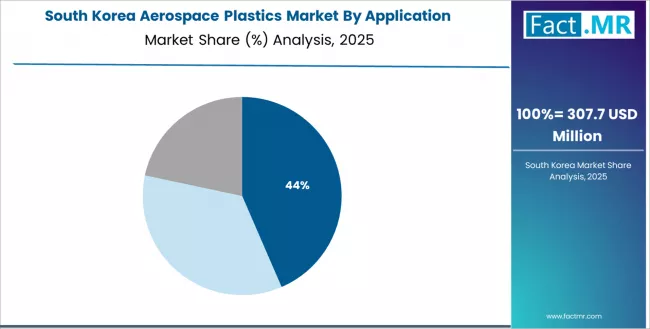
South Korea establishes aerospace innovation development through comprehensive aviation modernization and technology integration, integrating plastic systems across aerospace processing and aircraft applications. The country's 3.6% growth rate reflects growing innovation investment and increasing adoption of plastic technology that supports expanding use of advanced systems in Korean aerospace facilities. Growth concentrates in major industrial areas, including Sacheon, Changwon, and Seoul region, where aerospace technology development showcases integrated plastic systems that appeal to Korean operators seeking advanced aviation solutions with innovation compatibility.
Korean manufacturers focus on maintaining quality standards while adopting aerospace innovation, creating demand for systems that balance performance with technological advantages. The market benefits from strong aerospace infrastructure and growing export opportunities that support plastic technology adoption while maintaining quality standards important to Korean aviation applications.
Strategic Market Indicators:
- Technology-advanced aerospace facilities leading adoption with 72% deployment rate in innovation and aviation sectors
- Government innovation programs providing substantial investment in aerospace-focused technology development
- Local manufacturers capturing 38% market share through technological advancement and export excellence
- Strong export growth in premium aerospace plastic solutions targeting Asian and global aviation markets
Japan Demonstrates Premium Aerospace Focus
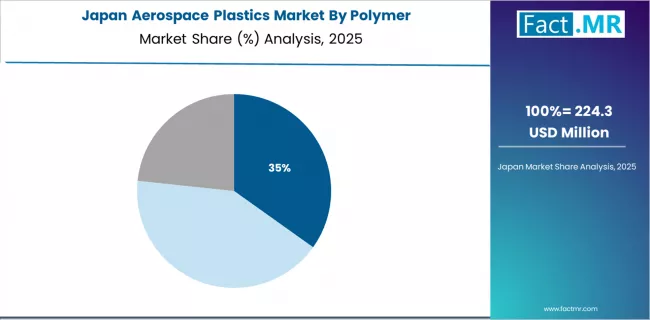
Japan's advanced aerospace technology market demonstrates sophisticated plastic system deployment with documented operational effectiveness in premium aircraft applications and specialty aviation projects through integration with existing quality systems and aerospace processing infrastructure.
The country maintains a 3.4% growth rate, leveraging traditional quality expertise and precision systems integration in plastic technology. Aerospace centers, including Tokyo region, Nagoya, and Kyushu, showcase premium installations where plastic systems integrate with traditional quality platforms and modern aerospace management systems to optimize aviation operations and maintain product quality profiles.
Japanese manufacturers prioritize aerospace precision and quality consistency in plastic development, creating demand for premium systems with advanced features, including quality monitoring and automated aerospace systems. The market benefits from established quality infrastructure and commitment to aerospace standards that provide long-term operational benefits and compliance with traditional quality aviation methods.
Strategic Market Indicators:
- Premium quality aerospace facilities leading adoption with 68% deployment rate in high-end aircraft and traditional sectors
- Traditional quality programs combined with modern innovation driving substantial investment in precision plastic technology
- Domestic manufacturers capturing 35% market share through quality excellence and precision manufacturing
- Export leadership in ultra-premium aerospace plastic solutions targeting global premium and specialty aviation markets
Europe Market Split by Country
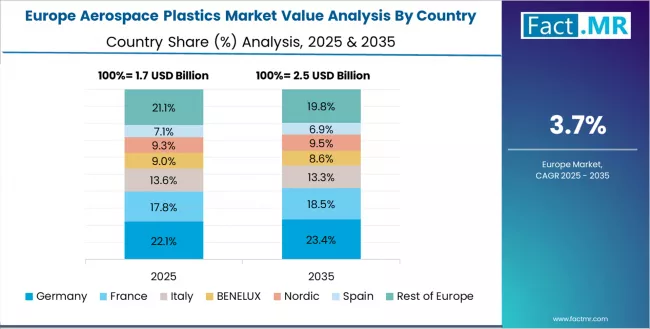
The aerospace plastics market in Europe is projected to grow from USD 2.0 billion in 2025 to USD 3.1 billion by 2035, registering a CAGR of 4.5% over the forecast period. Germany is expected to maintain its leadership position with a 28.5% market share in 2025, growing to 29.2% by 2035, supported by its advanced aerospace infrastructure and major aviation centers including Bavaria and Hamburg.
France follows with a 26.8% share in 2025, projected to reach 27.4% by 2035, driven by comprehensive aircraft programs and aerospace innovation development. The UK holds a 22.1% share in 2025, expected to maintain 21.6% by 2035 despite market adjustments. Italy commands a 13.2% share, while Spain accounts for 9.4% in 2025.
The rest of Europe is anticipated to gain momentum, maintaining its collective share at approximately 10.0% by 2035, attributed to increasing aerospace plastic adoption in Nordic countries and emerging aviation facilities implementing aerospace-focused programs.
Competitive Landscape of the Aerospace Plastics Market
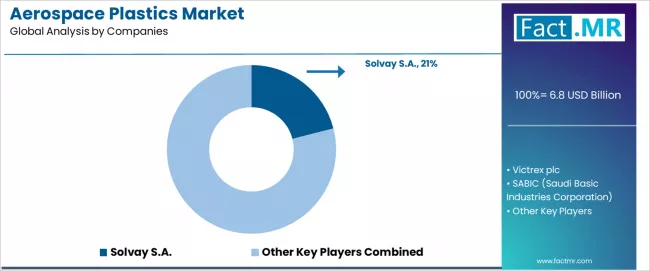
- Structure: ~12-16 credible players; top 5 hold ~48-53% by revenue.
- Leadership is maintained through: material expertise, certification innovation, and application reliability (performance consistency + safety compliance + aerospace integration).
- What's commoditizing: standard thermoplastics and basic cabin applications.
- Margin Opportunities: specialized high-performance solutions, structural applications integration, and comprehensive aerospace packages (certification services, performance management, quality monitoring).
| Stakeholder | What they actually control | Typical strengths | Typical blind spots |
|---|---|---|---|
| Global platforms | Plastic reach, deep material catalogs, manufacturing facilities | Broad availability, proven reliability, multi-region projects | Technology refresh cycles; application dependency management |
| Technology innovators | R&D capabilities; advanced plastic systems; aerospace interfaces | Latest technology first; attractive ROI on large projects | Service density outside core regions; customization complexity |
| Regional specialists | Local sourcing, fast delivery, nearby manufacturing support | "Close to site" support; pragmatic pricing; local aerospace codes | Technology gaps; talent retention in aerospace engineering |
| Quality-focused ecosystems | Manufacturing consistency, technical support, material sourcing | Lowest performance variation; comprehensive support | Manufacturing costs if overpromised; technology obsolescence |
| Application specialists | Specialized configurations, custom solutions, aerospace development | Win specialized projects; flexible engineering | Scalability limitations; narrow market focus |
Key Players in the Aerospace Plastics Market
- Solvay S.A.
- Victrex plc
- SABIC (Saudi Basic Industries Corporation)
- Evonik Industries AG
- Arkema S.A.
- Mitsubishi Chemical Group Corporation
- Toray Industries, Inc.
- DuPont de Nemours, Inc.
- Röhm GmbH
- Ensinger GmbH
Scope of the Report
| Items | Values |
|---|---|
| Quantitative Units (2025) | USD 6.8 billion |
| Polymer | PEEK/PEKK/PAEK, Polycarbonate & PMMA, PPS/PEI & Others |
| Application | Cabin Interiors, Airframe & Structures, Systems & Others |
| Aircraft | Commercial, Business & GA, Defense |
| Regions Covered | North America, Europe, Asia Pacific, South America, Middle East & Africa |
| Countries Covered | USA, Germany, France, UK, Japan, South Korea, Mexico, and 25+ additional countries |
| Key Companies Profiled | Solvay, Victrex, SABIC, Evonik, Arkema, Mitsubishi Chemical, Toray, DuPont |
| Additional Attributes | Dollar sales by polymer and application categories, regional adoption trends across North America, Europe, and Asia Pacific, competitive landscape with material manufacturers and aerospace suppliers, manufacturer preferences for plastic consistency and performance reliability, integration with aerospace processing platforms and manufacturing management systems, innovations in aerospace plastic technology and aviation enhancement, and development of advanced plastic solutions with enhanced performance and aerospace optimization capabilities. |
Aerospace Plastics Market by Segments
-
Polymer :
- PEEK/PEKK/PAEK
- Polycarbonate & PMMA
- PPS/PEI & Others
-
Application :
- Cabin Interiors
- Airframe & Structures
- Systems & Others
-
Aircraft :
- Commercial
- Business & GA
- Defense
-
Region :
- North America
- USA
- Canada
- Mexico
- Europe
- Germany
- France
- UK
- Italy
- Spain
- Rest of Europe
- Asia Pacific
- China
- Japan
- South Korea
- India
- ASEAN
- Australia & New Zealand
- Rest of Asia Pacific
- South America
- Brazil
- Rest of South America
- Middle East & Africa
- GCC Countries
- South Africa
- Rest of Middle East & Africa
- North America
Table of Content
- Executive Summary
- Global Market Outlook
- Demand to side Trends
- Supply to side Trends
- Technology Roadmap Analysis
- Analysis and Recommendations
- Market Overview
- Market Coverage / Taxonomy
- Market Definition / Scope / Limitations
- Market Background
- Market Dynamics
- Drivers
- Restraints
- Opportunity
- Trends
- Scenario Forecast
- Demand in Optimistic Scenario
- Demand in Likely Scenario
- Demand in Conservative Scenario
- Opportunity Map Analysis
- Product Life Cycle Analysis
- Supply Chain Analysis
- Investment Feasibility Matrix
- Value Chain Analysis
- PESTLE and Porter’s Analysis
- Regulatory Landscape
- Regional Parent Market Outlook
- Production and Consumption Statistics
- Import and Export Statistics
- Market Dynamics
- Global Market Analysis 2020 to 2024 and Forecast, 2025 to 2035
- Historical Market Size Value (USD Million) Analysis, 2020 to 2024
- Current and Future Market Size Value (USD Million) Projections, 2025 to 2035
- Y to o to Y Growth Trend Analysis
- Absolute $ Opportunity Analysis
- Global Market Pricing Analysis 2020 to 2024 and Forecast 2025 to 2035
- Global Market Analysis 2020 to 2024 and Forecast 2025 to 2035, By Polymer
- Introduction / Key Findings
- Historical Market Size Value (USD Million) Analysis By Polymer , 2020 to 2024
- Current and Future Market Size Value (USD Million) Analysis and Forecast By Polymer , 2025 to 2035
- PEEK/PEKK/PAEK
- Polycarbonate & PMMA
- PPS/PEI & Others
- Y to o to Y Growth Trend Analysis By Polymer , 2020 to 2024
- Absolute $ Opportunity Analysis By Polymer , 2025 to 2035
- Global Market Analysis 2020 to 2024 and Forecast 2025 to 2035, By Application
- Introduction / Key Findings
- Historical Market Size Value (USD Million) Analysis By Application, 2020 to 2024
- Current and Future Market Size Value (USD Million) Analysis and Forecast By Application, 2025 to 2035
- Cabin Interiors
- Airframe & Structures
- Systems & Others
- Y to o to Y Growth Trend Analysis By Application, 2020 to 2024
- Absolute $ Opportunity Analysis By Application, 2025 to 2035
- Global Market Analysis 2020 to 2024 and Forecast 2025 to 2035, By Aircraft
- Introduction / Key Findings
- Historical Market Size Value (USD Million) Analysis By Aircraft, 2020 to 2024
- Current and Future Market Size Value (USD Million) Analysis and Forecast By Aircraft, 2025 to 2035
- Commercial
- Business & GA
- Defense
- Y to o to Y Growth Trend Analysis By Aircraft, 2020 to 2024
- Absolute $ Opportunity Analysis By Aircraft, 2025 to 2035
- Global Market Analysis 2020 to 2024 and Forecast 2025 to 2035, By Region
- Introduction
- Historical Market Size Value (USD Million) Analysis By Region, 2020 to 2024
- Current Market Size Value (USD Million) Analysis and Forecast By Region, 2025 to 2035
- North America
- Latin America
- Western Europe
- Eastern Europe
- East Asia
- South Asia and Pacific
- Middle East & Africa
- Market Attractiveness Analysis By Region
- North America Market Analysis 2020 to 2024 and Forecast 2025 to 2035, By Country
- Historical Market Size Value (USD Million) Trend Analysis By Market Taxonomy, 2020 to 2024
- Market Size Value (USD Million) Forecast By Market Taxonomy, 2025 to 2035
- By Country
- USA
- Canada
- Mexico
- By Polymer
- By Application
- By Aircraft
- By Country
- Market Attractiveness Analysis
- By Country
- By Polymer
- By Application
- By Aircraft
- Key Takeaways
- Latin America Market Analysis 2020 to 2024 and Forecast 2025 to 2035, By Country
- Historical Market Size Value (USD Million) Trend Analysis By Market Taxonomy, 2020 to 2024
- Market Size Value (USD Million) Forecast By Market Taxonomy, 2025 to 2035
- By Country
- Brazil
- Chile
- Rest of Latin America
- By Polymer
- By Application
- By Aircraft
- By Country
- Market Attractiveness Analysis
- By Country
- By Polymer
- By Application
- By Aircraft
- Key Takeaways
- Western Europe Market Analysis 2020 to 2024 and Forecast 2025 to 2035, By Country
- Historical Market Size Value (USD Million) Trend Analysis By Market Taxonomy, 2020 to 2024
- Market Size Value (USD Million) Forecast By Market Taxonomy, 2025 to 2035
- By Country
- Germany
- UK
- Italy
- Spain
- France
- Nordic
- BENELUX
- Rest of Western Europe
- By Polymer
- By Application
- By Aircraft
- By Country
- Market Attractiveness Analysis
- By Country
- By Polymer
- By Application
- By Aircraft
- Key Takeaways
- Eastern Europe Market Analysis 2020 to 2024 and Forecast 2025 to 2035, By Country
- Historical Market Size Value (USD Million) Trend Analysis By Market Taxonomy, 2020 to 2024
- Market Size Value (USD Million) Forecast By Market Taxonomy, 2025 to 2035
- By Country
- Russia
- Poland
- Hungary
- Balkan & Baltic
- Rest of Eastern Europe
- By Polymer
- By Application
- By Aircraft
- By Country
- Market Attractiveness Analysis
- By Country
- By Polymer
- By Application
- By Aircraft
- Key Takeaways
- East Asia Market Analysis 2020 to 2024 and Forecast 2025 to 2035, By Country
- Historical Market Size Value (USD Million) Trend Analysis By Market Taxonomy, 2020 to 2024
- Market Size Value (USD Million) Forecast By Market Taxonomy, 2025 to 2035
- By Country
- China
- Japan
- South Korea
- By Polymer
- By Application
- By Aircraft
- By Country
- Market Attractiveness Analysis
- By Country
- By Polymer
- By Application
- By Aircraft
- Key Takeaways
- South Asia and Pacific Market Analysis 2020 to 2024 and Forecast 2025 to 2035, By Country
- Historical Market Size Value (USD Million) Trend Analysis By Market Taxonomy, 2020 to 2024
- Market Size Value (USD Million) Forecast By Market Taxonomy, 2025 to 2035
- By Country
- India
- ASEAN
- Australia & New Zealand
- Rest of South Asia and Pacific
- By Polymer
- By Application
- By Aircraft
- By Country
- Market Attractiveness Analysis
- By Country
- By Polymer
- By Application
- By Aircraft
- Key Takeaways
- Middle East & Africa Market Analysis 2020 to 2024 and Forecast 2025 to 2035, By Country
- Historical Market Size Value (USD Million) Trend Analysis By Market Taxonomy, 2020 to 2024
- Market Size Value (USD Million) Forecast By Market Taxonomy, 2025 to 2035
- By Country
- Kingdom of Saudi Arabia
- Other GCC Countries
- Turkiye
- South Africa
- Other African Union
- Rest of Middle East & Africa
- By Polymer
- By Application
- By Aircraft
- By Country
- Market Attractiveness Analysis
- By Country
- By Polymer
- By Application
- By Aircraft
- Key Takeaways
- Key Countries Market Analysis
- USA
- Pricing Analysis
- Market Share Analysis, 2024
- By Polymer
- By Application
- By Aircraft
- Canada
- Pricing Analysis
- Market Share Analysis, 2024
- By Polymer
- By Application
- By Aircraft
- Mexico
- Pricing Analysis
- Market Share Analysis, 2024
- By Polymer
- By Application
- By Aircraft
- Brazil
- Pricing Analysis
- Market Share Analysis, 2024
- By Polymer
- By Application
- By Aircraft
- Chile
- Pricing Analysis
- Market Share Analysis, 2024
- By Polymer
- By Application
- By Aircraft
- Germany
- Pricing Analysis
- Market Share Analysis, 2024
- By Polymer
- By Application
- By Aircraft
- UK
- Pricing Analysis
- Market Share Analysis, 2024
- By Polymer
- By Application
- By Aircraft
- Italy
- Pricing Analysis
- Market Share Analysis, 2024
- By Polymer
- By Application
- By Aircraft
- Spain
- Pricing Analysis
- Market Share Analysis, 2024
- By Polymer
- By Application
- By Aircraft
- France
- Pricing Analysis
- Market Share Analysis, 2024
- By Polymer
- By Application
- By Aircraft
- India
- Pricing Analysis
- Market Share Analysis, 2024
- By Polymer
- By Application
- By Aircraft
- ASEAN
- Pricing Analysis
- Market Share Analysis, 2024
- By Polymer
- By Application
- By Aircraft
- Australia & New Zealand
- Pricing Analysis
- Market Share Analysis, 2024
- By Polymer
- By Application
- By Aircraft
- China
- Pricing Analysis
- Market Share Analysis, 2024
- By Polymer
- By Application
- By Aircraft
- Japan
- Pricing Analysis
- Market Share Analysis, 2024
- By Polymer
- By Application
- By Aircraft
- South Korea
- Pricing Analysis
- Market Share Analysis, 2024
- By Polymer
- By Application
- By Aircraft
- Russia
- Pricing Analysis
- Market Share Analysis, 2024
- By Polymer
- By Application
- By Aircraft
- Poland
- Pricing Analysis
- Market Share Analysis, 2024
- By Polymer
- By Application
- By Aircraft
- Hungary
- Pricing Analysis
- Market Share Analysis, 2024
- By Polymer
- By Application
- By Aircraft
- Kingdom of Saudi Arabia
- Pricing Analysis
- Market Share Analysis, 2024
- By Polymer
- By Application
- By Aircraft
- Turkiye
- Pricing Analysis
- Market Share Analysis, 2024
- By Polymer
- By Application
- By Aircraft
- South Africa
- Pricing Analysis
- Market Share Analysis, 2024
- By Polymer
- By Application
- By Aircraft
- USA
- Market Structure Analysis
- Competition Dashboard
- Competition Benchmarking
- Market Share Analysis of Top Players
- By Regional
- By Polymer
- By Application
- By Aircraft
- Competition Analysis
- Competition Deep Dive
- Solvay S.A.
- Overview
- Product Portfolio
- Profitability by Market Segments (Product/Age /Sales Channel/Region)
- Sales Footprint
- Strategy Overview
- Marketing Strategy
- Product Strategy
- Channel Strategy
- Victrex plc
- SABIC (Saudi Basic Industries Corporation)
- Evonik Industries AG
- Arkema S.A.
- Mitsubishi Chemical Group Corporation
- Toray Industries, Inc.
- DuPont de Nemours, Inc.
- Röhm GmbH
- Ensinger GmbH
- Solvay S.A.
- Competition Deep Dive
- Assumptions & Acronyms Used
- Research Methodology
List Of Table
- Table 1: Global Market Value (USD Million) Forecast by Region, 2020 to 2035
- Table 2: Global Market Value (USD Million) Forecast by Polymer , 2020 to 2035
- Table 3: Global Market Value (USD Million) Forecast by Application, 2020 to 2035
- Table 4: Global Market Value (USD Million) Forecast by Aircraft, 2020 to 2035
- Table 5: North America Market Value (USD Million) Forecast by Country, 2020 to 2035
- Table 6: North America Market Value (USD Million) Forecast by Polymer , 2020 to 2035
- Table 7: North America Market Value (USD Million) Forecast by Application, 2020 to 2035
- Table 8: North America Market Value (USD Million) Forecast by Aircraft, 2020 to 2035
- Table 9: Latin America Market Value (USD Million) Forecast by Country, 2020 to 2035
- Table 10: Latin America Market Value (USD Million) Forecast by Polymer , 2020 to 2035
- Table 11: Latin America Market Value (USD Million) Forecast by Application, 2020 to 2035
- Table 12: Latin America Market Value (USD Million) Forecast by Aircraft, 2020 to 2035
- Table 13: Western Europe Market Value (USD Million) Forecast by Country, 2020 to 2035
- Table 14: Western Europe Market Value (USD Million) Forecast by Polymer , 2020 to 2035
- Table 15: Western Europe Market Value (USD Million) Forecast by Application, 2020 to 2035
- Table 16: Western Europe Market Value (USD Million) Forecast by Aircraft, 2020 to 2035
- Table 17: Eastern Europe Market Value (USD Million) Forecast by Country, 2020 to 2035
- Table 18: Eastern Europe Market Value (USD Million) Forecast by Polymer , 2020 to 2035
- Table 19: Eastern Europe Market Value (USD Million) Forecast by Application, 2020 to 2035
- Table 20: Eastern Europe Market Value (USD Million) Forecast by Aircraft, 2020 to 2035
- Table 21: East Asia Market Value (USD Million) Forecast by Country, 2020 to 2035
- Table 22: East Asia Market Value (USD Million) Forecast by Polymer , 2020 to 2035
- Table 23: East Asia Market Value (USD Million) Forecast by Application, 2020 to 2035
- Table 24: East Asia Market Value (USD Million) Forecast by Aircraft, 2020 to 2035
- Table 25: South Asia and Pacific Market Value (USD Million) Forecast by Country, 2020 to 2035
- Table 26: South Asia and Pacific Market Value (USD Million) Forecast by Polymer , 2020 to 2035
- Table 27: South Asia and Pacific Market Value (USD Million) Forecast by Application, 2020 to 2035
- Table 28: South Asia and Pacific Market Value (USD Million) Forecast by Aircraft, 2020 to 2035
- Table 29: Middle East & Africa Market Value (USD Million) Forecast by Country, 2020 to 2035
- Table 30: Middle East & Africa Market Value (USD Million) Forecast by Polymer , 2020 to 2035
- Table 31: Middle East & Africa Market Value (USD Million) Forecast by Application, 2020 to 2035
- Table 32: Middle East & Africa Market Value (USD Million) Forecast by Aircraft, 2020 to 2035
List Of Figures
- Figure 1: Global Market Pricing Analysis
- Figure 2: Global Market Value (USD Million) Forecast 2020-2035
- Figure 3: Global Market Value Share and BPS Analysis by Polymer , 2025 and 2035
- Figure 4: Global Market Y to o to Y Growth Comparison by Polymer , 2025-2035
- Figure 5: Global Market Attractiveness Analysis by Polymer
- Figure 6: Global Market Value Share and BPS Analysis by Application, 2025 and 2035
- Figure 7: Global Market Y to o to Y Growth Comparison by Application, 2025-2035
- Figure 8: Global Market Attractiveness Analysis by Application
- Figure 9: Global Market Value Share and BPS Analysis by Aircraft, 2025 and 2035
- Figure 10: Global Market Y to o to Y Growth Comparison by Aircraft, 2025-2035
- Figure 11: Global Market Attractiveness Analysis by Aircraft
- Figure 12: Global Market Value (USD Million) Share and BPS Analysis by Region, 2025 and 2035
- Figure 13: Global Market Y to o to Y Growth Comparison by Region, 2025-2035
- Figure 14: Global Market Attractiveness Analysis by Region
- Figure 15: North America Market Incremental Dollar Opportunity, 2025-2035
- Figure 16: Latin America Market Incremental Dollar Opportunity, 2025-2035
- Figure 17: Western Europe Market Incremental Dollar Opportunity, 2025-2035
- Figure 18: Eastern Europe Market Incremental Dollar Opportunity, 2025-2035
- Figure 19: East Asia Market Incremental Dollar Opportunity, 2025-2035
- Figure 20: South Asia and Pacific Market Incremental Dollar Opportunity, 2025-2035
- Figure 21: Middle East & Africa Market Incremental Dollar Opportunity, 2025-2035
- Figure 22: North America Market Value Share and BPS Analysis by Country, 2025 and 2035
- Figure 23: North America Market Value Share and BPS Analysis by Polymer , 2025 and 2035
- Figure 24: North America Market Y to o to Y Growth Comparison by Polymer , 2025-2035
- Figure 25: North America Market Attractiveness Analysis by Polymer
- Figure 26: North America Market Value Share and BPS Analysis by Application, 2025 and 2035
- Figure 27: North America Market Y to o to Y Growth Comparison by Application, 2025-2035
- Figure 28: North America Market Attractiveness Analysis by Application
- Figure 29: North America Market Value Share and BPS Analysis by Aircraft, 2025 and 2035
- Figure 30: North America Market Y to o to Y Growth Comparison by Aircraft, 2025-2035
- Figure 31: North America Market Attractiveness Analysis by Aircraft
- Figure 32: Latin America Market Value Share and BPS Analysis by Country, 2025 and 2035
- Figure 33: Latin America Market Value Share and BPS Analysis by Polymer , 2025 and 2035
- Figure 34: Latin America Market Y to o to Y Growth Comparison by Polymer , 2025-2035
- Figure 35: Latin America Market Attractiveness Analysis by Polymer
- Figure 36: Latin America Market Value Share and BPS Analysis by Application, 2025 and 2035
- Figure 37: Latin America Market Y to o to Y Growth Comparison by Application, 2025-2035
- Figure 38: Latin America Market Attractiveness Analysis by Application
- Figure 39: Latin America Market Value Share and BPS Analysis by Aircraft, 2025 and 2035
- Figure 40: Latin America Market Y to o to Y Growth Comparison by Aircraft, 2025-2035
- Figure 41: Latin America Market Attractiveness Analysis by Aircraft
- Figure 42: Western Europe Market Value Share and BPS Analysis by Country, 2025 and 2035
- Figure 43: Western Europe Market Value Share and BPS Analysis by Polymer , 2025 and 2035
- Figure 44: Western Europe Market Y to o to Y Growth Comparison by Polymer , 2025-2035
- Figure 45: Western Europe Market Attractiveness Analysis by Polymer
- Figure 46: Western Europe Market Value Share and BPS Analysis by Application, 2025 and 2035
- Figure 47: Western Europe Market Y to o to Y Growth Comparison by Application, 2025-2035
- Figure 48: Western Europe Market Attractiveness Analysis by Application
- Figure 49: Western Europe Market Value Share and BPS Analysis by Aircraft, 2025 and 2035
- Figure 50: Western Europe Market Y to o to Y Growth Comparison by Aircraft, 2025-2035
- Figure 51: Western Europe Market Attractiveness Analysis by Aircraft
- Figure 52: Eastern Europe Market Value Share and BPS Analysis by Country, 2025 and 2035
- Figure 53: Eastern Europe Market Value Share and BPS Analysis by Polymer , 2025 and 2035
- Figure 54: Eastern Europe Market Y to o to Y Growth Comparison by Polymer , 2025-2035
- Figure 55: Eastern Europe Market Attractiveness Analysis by Polymer
- Figure 56: Eastern Europe Market Value Share and BPS Analysis by Application, 2025 and 2035
- Figure 57: Eastern Europe Market Y to o to Y Growth Comparison by Application, 2025-2035
- Figure 58: Eastern Europe Market Attractiveness Analysis by Application
- Figure 59: Eastern Europe Market Value Share and BPS Analysis by Aircraft, 2025 and 2035
- Figure 60: Eastern Europe Market Y to o to Y Growth Comparison by Aircraft, 2025-2035
- Figure 61: Eastern Europe Market Attractiveness Analysis by Aircraft
- Figure 62: East Asia Market Value Share and BPS Analysis by Country, 2025 and 2035
- Figure 63: East Asia Market Value Share and BPS Analysis by Polymer , 2025 and 2035
- Figure 64: East Asia Market Y to o to Y Growth Comparison by Polymer , 2025-2035
- Figure 65: East Asia Market Attractiveness Analysis by Polymer
- Figure 66: East Asia Market Value Share and BPS Analysis by Application, 2025 and 2035
- Figure 67: East Asia Market Y to o to Y Growth Comparison by Application, 2025-2035
- Figure 68: East Asia Market Attractiveness Analysis by Application
- Figure 69: East Asia Market Value Share and BPS Analysis by Aircraft, 2025 and 2035
- Figure 70: East Asia Market Y to o to Y Growth Comparison by Aircraft, 2025-2035
- Figure 71: East Asia Market Attractiveness Analysis by Aircraft
- Figure 72: South Asia and Pacific Market Value Share and BPS Analysis by Country, 2025 and 2035
- Figure 73: South Asia and Pacific Market Value Share and BPS Analysis by Polymer , 2025 and 2035
- Figure 74: South Asia and Pacific Market Y to o to Y Growth Comparison by Polymer , 2025-2035
- Figure 75: South Asia and Pacific Market Attractiveness Analysis by Polymer
- Figure 76: South Asia and Pacific Market Value Share and BPS Analysis by Application, 2025 and 2035
- Figure 77: South Asia and Pacific Market Y to o to Y Growth Comparison by Application, 2025-2035
- Figure 78: South Asia and Pacific Market Attractiveness Analysis by Application
- Figure 79: South Asia and Pacific Market Value Share and BPS Analysis by Aircraft, 2025 and 2035
- Figure 80: South Asia and Pacific Market Y to o to Y Growth Comparison by Aircraft, 2025-2035
- Figure 81: South Asia and Pacific Market Attractiveness Analysis by Aircraft
- Figure 82: Middle East & Africa Market Value Share and BPS Analysis by Country, 2025 and 2035
- Figure 83: Middle East & Africa Market Value Share and BPS Analysis by Polymer , 2025 and 2035
- Figure 84: Middle East & Africa Market Y to o to Y Growth Comparison by Polymer , 2025-2035
- Figure 85: Middle East & Africa Market Attractiveness Analysis by Polymer
- Figure 86: Middle East & Africa Market Value Share and BPS Analysis by Application, 2025 and 2035
- Figure 87: Middle East & Africa Market Y to o to Y Growth Comparison by Application, 2025-2035
- Figure 88: Middle East & Africa Market Attractiveness Analysis by Application
- Figure 89: Middle East & Africa Market Value Share and BPS Analysis by Aircraft, 2025 and 2035
- Figure 90: Middle East & Africa Market Y to o to Y Growth Comparison by Aircraft, 2025-2035
- Figure 91: Middle East & Africa Market Attractiveness Analysis by Aircraft
- Figure 92: Global Market - Tier Structure Analysis
- Figure 93: Global Market - Company Share Analysis
- FAQs -
How big is the aerospace plastics market in 2025?
The global aerospace plastics market is estimated to be valued at USD 6.8 billion in 2025.
What will be the size of aerospace plastics market in 2035?
The market size for the aerospace plastics market is projected to reach USD 10.4 billion by 2035.
How much will be the aerospace plastics market growth between 2025 and 2035?
The aerospace plastics market is expected to grow at a 4.3% CAGR between 2025 and 2035.
What are the key product types in the aerospace plastics market?
The key product types in aerospace plastics market are peek/pekk/paek, polycarbonate & pmma and pps/pei & others.
Which application segment to contribute significant share in the aerospace plastics market in 2025?
In terms of application, cabin interiors segment to command 45.0% share in the aerospace plastics market in 2025.